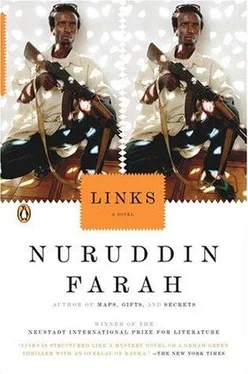The waitress who served their spaghetti all’amatriciana, was not the one who had taken the order, and apparently she knew Af-Laawe. “Would you like me to bring your usual with your meal?” she said.
Af-Laawe shook his head no, then asked Jeebleh what he might like to drink. Jeebleh ordered lemonade, and Af-Laawe told the waitress to make it two.
“If I remember correctly, the driver who gave me a lift from the airport, thanks to your kindness, told me that you lived in Alsace. When did you come home from Alsace?” Jeebleh asked.
“I bought myself a ticket as soon as I heard that the Dictator had been chased out,” Af-Laawe said. “When I arrived, there was still a palpable joy in the city because he had fled. The mood was short-lived, however. Soon it became a matter of us and them, clan families versus clan families. Instead of celebrating victory, it was the start of the war of the intimates! I couldn’t stand the thought of being part of this kind of schism, so I returned to Alsace.”
“Were you here during the four-month war between the two Strongmen, when the city was severed in two?” Jeebleh asked.
“I wasn’t here, but we are still living with the consequences of that war.”
“How so?”
“Those four months of war made it clear that the idea of the clan is a sham, as some of us believed all along,” Af-Laawe said. “More recently, those of us who think of ourselves as progressive argue not only that the clan is a sham, but that you cannot organize civil society around it.”
“When did you come back to Mogadiscio?”
“I returned a few months after UNOSOM got here.”
When they had finished the first course, Af-Laawe asked for his usual, which Jeebleh suspected had in it a tot of something forbidden in an Islamic country. Eventually another waitress brought baked fish in garlic sauce for Af-Laawe and pepper steak, well done, for Jeebleh, and a salad for each. Jeebleh listened, as Af-Laawe continued talking.
“Some of us are of a ‘we’ generation, others a ‘me’ generation. You mix the two modes of being, and things become awkward, unmanageable. I belong to the me generation, whereas my clan elders belong to the we generation. A man with a me mindset and a family of four — a wife and two children — celebrates the idea of ‘me.’ It is not so when it comes to our clansmen who visit from the hinterland, and who celebrate a ‘we.’ They believe in the clan, and they know no better — many of them have never been to school or out of the country. I am included in their self-serving ‘we.’ This leads to chaos.”
Pausing, he glanced at Jeebleh, who obviously wasn’t enjoying this monologue. Af-Laawe resumed: “You and I belong to the me generation. We’re professionals with qualifications, and we can survive on our own anywhere. You’re a university professor, and I am a highly paid consultant. So far so good?”
It wasn’t, but what the hell. Jeebleh nodded.
“But while our European counterparts belong wholeheartedly to the me idea, you and I belong at one and the same time to the me and the we. After all, we have extended families to clothe and to feed, by fair means or foul. You and I, indeed many of us first-generation schoolgoers, are made up of competing ways of doing things.”
Jeebleh didn’t agree with the spin that Af-Laawe put on things, his belief that educated Somalis didn’t believe in the clan; he, Jeebleh, knew many who did. But he chose not to challenge.
“If you peel away the political rhetoric,” Af-Laawe went on, “what you have is a me grievance dressed in we clothing! And with such overriding loyalties, driven by personal ambitions, the invented memories of a me are cast in an imagined we. This way ‘me’ is reinvented as ‘we.’”
To Jeebleh, Af-Laawe’s nonsensical double-talk made mockery of his own earlier pronoun fixation, and he was relieved when the waitress came to clear their plates. Af-Laawe ordered a cappuccino, and Jeebleh a double espresso.
As the waitress walked away, Jeebleh said, “Do you have any sympathy whatsoever for the warlords?”
“How can I raise a heart of sympathies for killers?”
AS THEY WALKED BACK TO THE HOTEL, THE STARES OF THE PEOPLE THEY encountered overwhelmed Jeebleh with foreboding. He had no idea why the feeling had come over him. He wanted to be alone, that was his instantaneous reaction. In times of sorrow, he tended to enjoy being by himself. Alas, this was not possible here on unfamiliar ground. He didn’t know how to get back, or where the dangers lurked.
As if to reinforce the point, as soon as they walked into the hotel grounds, he saw that the vultures were back in force. And a horde of buzzing flies hovered over a spot as red as fresh slaughter. Ali, the manager, met them in the courtyard, disheveled and distraught; you could see he was the bearer of sad news. Curiously, he spoke only to Af-Laawe, as if Jeebleh, a foreigner, did not understand Somali, or were not there at all.
Shaken by the story he had to tell, Ali spoke confusedly, starting where he should have ended. “There were two of them, both young,” he said.
“Two? Who?” Af-Laawe instructed Ali to calm down, not once but several times.
His shirt hanging out, his fly open — something he didn’t notice till later — the manager tried two or three times to begin from the beginning. Still, Jeebleh and Af-Laawe failed to understand. Finally he came out with: “One of them was killed.”
“But who do you mean?”
“And the other, he was wounded, and has since been captured by our guards, and taken to a nearby hospital, where he is recovering.”
The story became clearer in the fourth retelling. Two young men with firearms had sneaked into the hotel, and — with help from a staff member, who had since been fired — got into Jeebleh’s suite and hid there. A cleaning woman noticed a suspicious presence and reported it to the reception desk. Hotel security was alerted, there was a scuffle, shots were fired, and one of the intruders died inside. (“You can see his blood on the balcony, although his corpse has been removed,” the manager elaborated.) The wounded one was apprehended and interrogated. When he was frisked by hotel security, “incriminating evidence” was found in his pocket.
“What kind of evidence?” Jeebleh asked.
Ali spoke directly to Jeebleh for the first time since their return to the hotel. “He had your name and suite number written on a piece of paper. We’ve interrogated him, as I’ve already explained, and even though he hasn’t volunteered a lot, we’re satisfied with what we’ve gotten out of him.”
“But this is madness!” Af-Laawe said.
The manager sobered up, perhaps at the word “madness.” He continued to address Jeebleh, “There’s no reason to panic. We’ll change your room, give you my suite. It’s much more comfortable, and a lot more secure. We’ll beef up the security around you. No reason to panic. We’ll take care of you, despite what’s happened, or what you’ve done here on my hotel grounds. I guarantee that you’re safe with us, safe!”
“Where’s the corpse?” Af-Laawe asked.
“In your van.”
“And my bags?” Jeebleh asked.
“In my suite, safe.”
Jeebleh was relieved that he had had the foresight to leave his valuables with Bile. He decided to call him and ask him to send Dajaal, with a driver, to fetch him. He needed a quiet moment, to contemplate all this madness.
He stood apart, and used the mobile phone. “I need your immediate help, Bile,” he said. “It’s urgent.”
“Where are you, what’s happening?”
“I need you to get me away from this place.”
“What’s happened?”
“A young man found hiding in my room has been shot dead, another has been wounded.” Jeebleh’s voice was low, charged with a mix of anger and terror; his whole body was shaking. “I’ve no idea what’s happening. I want to leave this place as fast as I possibly can. Please send Dajaal.”
Читать дальше












